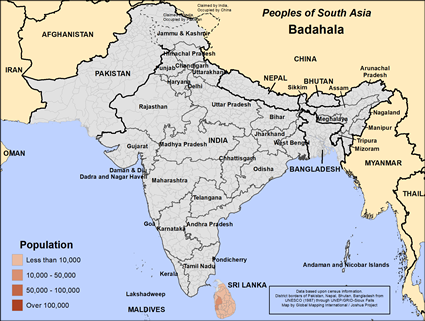The Badahala people of Sri Lanka speak Sinhala, the primary language of the Sinhalese majority. Historically, they belong to a caste traditionally associated with pottery and clay work, a role that dates back to the island's feudal era when caste determined occupation and social status. The name "Badahala" is linked to their craft heritage, which served both domestic and ritual needs in Buddhist society. Over centuries, the Badahala remained a small but distinct community within the Sinhalese social hierarchy. Colonial rule and modernization weakened caste-based restrictions, yet cultural identity tied to traditional occupations persists in rural areas. Today, many Badahala families live in provinces such as Western, North Western, Southern, and Central Sri Lanka, where they maintain a mix of traditional and modern livelihoods.
Badahala families historically earned their living by crafting clay pots and other earthenware, essential for household use and temple rituals. While some continue this craft, economic pressures and modernization have pushed many into wage labor, agriculture, and urban employment. Education has opened doors for younger generations, but rural communities still face limited opportunities and seasonal income instability. Social mobility is constrained by lingering caste prejudice, which influences marriage and community interactions.
The Badahala are predominantly Theravada Buddhists, deeply integrated into the Sinhalese Buddhist cultural framework. Their spiritual life revolves around temple worship, observance of Buddhist festivals, and merit-making rituals. Folk practices often accompany orthodox Buddhism, including offerings to deities and participation in ceremonies that blend animistic elements with Buddhist traditions. While Buddhism shapes their worldview, there is some exposure to the gospel. There is a significant opportunity for workers to share the hope of Christ and nurture communities grounded in Scripture.
Economic vulnerability remains a pressing concern, especially for families dependent on traditional pottery work or low-paying labor. Access to education and vocational training is essential for breaking cycles of poverty and enabling sustainable livelihoods. Healthcare and nutrition are critical needs in rural areas where resources are scarce.
Spiritually, the Badahala need freedom from ritual-based religion and the life-transforming message that Jesus Christ offers abundant life to all who ask. Without intentional discipleship, cultural Buddhism will continue to dominate, leaving hearts unreached by Christ's grace. Emerging Christian communities require strong biblically-based leadership development to grow in faith and join the global mission movement.
Pray for God's provision of education, jobs, and healthcare for Badahala families.
Ask the Lord to send faithful workers who will share the gospel and disciple new believers among the Badahala.
Intercede for spiritual breakthrough, that cultural Buddhism would give way to vibrant faith in Christ and active participation in his mission.
Pray for unity and courage among Badahala Christians, that they would overcome social barriers and become bold witnesses in their communities.
Lift up the next generation, that they would embrace Jesus personally and join the global discipleship force.
Scripture Prayers for the Badahala in Sri Lanka.
Caste System in Sri Lanka – Wikipedia
Sri Lanka Brief – Caste-Based Culture and Development
Religious Beliefs in Sri Lanka – WorldAtlas
A Review of Origins and Evolution of the Caste System in Sri Lanka
| Profile Source: Joshua Project |











